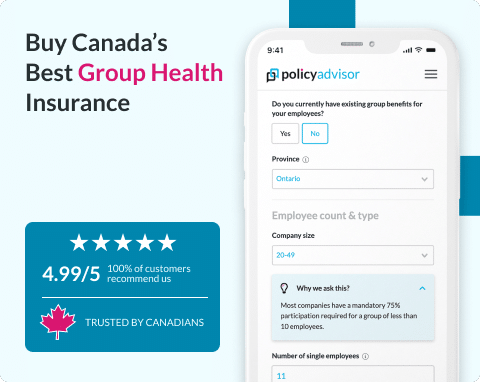- Pooled benefits lower premiums by spreading risk across multiple businesses
- Claims are shared in pooled plans, reducing financial strain on individual employers
- Pooled benefits help businesses plan for employee benefits without unexpected increases
- Small businesses can offer competitive benefits similar to large corporations through pooled benefits plans
- What is group health insurance and what does it cover?
- What are pooled group health benefits?
- How do pooled benefits work?
- What are the types of employee benefits pooling?
- What are the key advantages of pooled benefits?
- How to choose the best pooled benefits plan in Canada?
- Frequently asked questions
Healthcare costs in Canada keep rising with a doctor’s visit costing between $100 and $600, and an emergency room or hospitalization costing as high as $6,000 per day!
In these situations, small and mid-sized companies often struggle to afford group health insurance. Pooled benefits provide a cost-effective solution by sharing risks across multiple employers.
In this article, we’ll explain what pooled benefits are, how they compare to traditional group insurance, and the key advantages they offer businesses. We’ll also explore different types of pooled employer plans and factors to consider when choosing a plan.
What is group health insurance and what does it cover?
Group health insurance provides medical coverage to employees under a single policy sponsored by their employer. It helps businesses offer affordable healthcare benefits by spreading the risk among a larger group, resulting in lower premiums compared to individual plans.
Typical coverage includes prescription drugs, dental and vision care, paramedical services (e.g., physiotherapy, chiropractic care), hospital stays, and emergency medical expenses.
Some plans also offer mental health support, health spending accounts, critical illness coverage, and accident and disability insurance.
What are pooled group health benefits?
Pooled benefits combine multiple employers into one insurance plan so that they can access better coverage at a lower, more stable cost. Instead of each business managing its own risk, claims and expenses are spread across a larger group.
This reduces cost volatility and helps small businesses provide comprehensive employee benefits that would otherwise be unaffordable.
| Aspect | Pooled benefits | Traditional group insurance |
| Risk distribution | Shared across multiple employers | Each company bears its own risk |
| Cost stability | More predictable premiums | Costs vary based on claims |
| Coverage options | Broader benefits at lower costs | Customization is available but expensive |
| Ideal for | Small to mid-sized businesses | Larger companies with higher budgets |
How do pooled benefits work?
Pooled benefits allow small businesses to access stable and cost-effective group insurance by sharing risk with other companies.
- Mechanics: Insurance providers aggregate multiple small groups into a single risk pool, with premiums based on the collective claims experience rather than individual company claims
- Administration: Insurers handle enrollment and claims processing, simplifying management for employers
- Eligibility: Typically available to small businesses that meet insurer criteria
This means, that if one business in the pool experiences a spike in claims, the overall impact on premiums is minimized because costs are spread across the entire pool.
What are the types of employee benefits pooling?
Employee benefits plans can involve pooling in different ways, depending on your organization’s needs. However, there are three ways benefits are commonly pooled:
- Full plan pooling: The benefits plan is pooled with other organizations, transferring all risk to the insurer. This is ideal for small groups (e.g., 10 employees) where even minor claim increases could significantly impact costs
- Selective benefit pooling: Only high-risk benefits (e.g., long-term disability, life insurance) are pooled, while more predictable benefits (e.g., health, dental) remain unpooled. Larger groups (e.g., 200 employees) can opt for this to benefit from lower-than-expected claims
- Claim-level pooling: Specific high-cost risks within a benefit category such as unlimited prescription drug coverage or out-of-country claims are pooled to prevent financial strain. This approach is typically used for very large groups (1,000+ employees)
What are the key advantages of pooled benefits?
Pooled benefits are cost-efficient, help in managing risks efficiently, allow for predictable budgeting, and offer access to comprehensive coverage for employees.
Cost efficiency
- Pooled benefits lower premiums by spreading risks across multiple companies
- Businesses avoid sudden cost increases due to high claims
Risk management
- Claims are distributed among a larger group, reducing the impact on individual employers
- Businesses don’t face large premium hikes after a bad claims year
Predictable budgeting
- Costs remain stable, making it easier for businesses to plan ahead
- Employers avoid unexpected financial strain from high claims
Access to comprehensive coverage
- Smaller businesses can access benefits that would otherwise be too expensive
- Employees get a better benefits package, improving satisfaction and retention
How to choose the best pooled benefits plan in Canada?
Selecting the right pooled benefits plan depends on your business size, employee needs, and budget. Here are key factors to consider:
- Determine your company’s needs
- Understand whether employees value retirement savings, health coverage, or both
- Speak to our group health insurance advisors and compare plans from across 30+ insurers in Canada
Looking for affordable pooled benefits plans? Let our advisors help you!
Our expert advisors specialize in group benefits and will guide you through selecting the right plan for your business.
- Compare plans – We work with 30+ top providers to find the best fit for your company
- Smart matching – Get connected with the right advisor based on your business needs and goals
- No-obligation consultation – Ask questions and get clear recommendations without any pressure
Make the right choice for your team. Schedule a free consultation with PolicyAdvisor today!
Frequently asked questions
How does joining a pooled benefits plan impact my employees?
Enrolling in a pooled benefits plan gives employees access to broader health coverage at more affordable rates. It can reduce out-of-pocket expenses while improving overall benefits, leading to better health outcomes and increased job satisfaction.
Can small businesses take advantage of pooled employer plans?
Yes, pooled employer plans are designed for small businesses, allowing them to share costs and risks with other companies. This makes it easier to offer competitive health benefits without the high expenses of standalone plans.
What if my company’s claims exceed the pooled limit?
If claims exceed the pooled limit, the insurance provider typically covers the excess costs, as the financial risk is distributed among all participating employers. This structure helps protect individual businesses from unexpected high claims.
Are there tax benefits for businesses using pooled benefits?
Yes, employer contributions to pooled benefits plans are often tax-deductible as a business expense. Additionally, employees may receive certain benefits tax-free. However, consulting an experienced advisor will help you understand tax benefits in pooled plans better.
Pooled benefits offer a cost-effective way for small and mid-sized businesses in Canada to provide group health insurance. By spreading risk across multiple employers, these plans help lower premiums, stabilize costs, and provide broader coverage. This article explores how pooled benefits compare to traditional group insurance, their key advantages, types of pooled employer plans, and how to select the right one for your business.


 1-888-601-9980
1-888-601-9980



